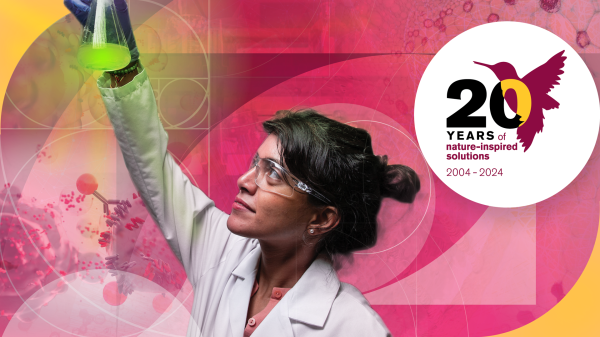ASU researchers awarded seed grant to support community technical and environmental co-design activities at Mirabella

The research team exploring pollinator gardens includes Stacey Kuznetsov, Tejaswi Gowda, Alejandra Rodriguez Vega, Alice Letcher, Darlene Cavalier and Gwen Iacona. Image courtesy of Alejandra Rodriguez Vega
A group of Arizona State University researchers in the School of Arts, Media and Engineering and School for the Future of Innovation in Society has been awarded a seed grant of $10,000 to explore pollinator gardens as sites of community science and environmental activism. Pollinator gardens are gardens designed to attract butterflies, bees and other species that transfer pollen.
“Our long-term vision is to develop low-cost pollinator garden kits consisting of organic materials (e.g., seeds, soil, etc.) and networked digital sensors to enable communities to create pollinator habitats, monitor local environments and observe ecosystem biomarkers,” said Arts, Media and Engineering Assistant Professor Stacey Kuznetsov, one of the researchers on the team.
“The project will contribute to our understanding of which plant species are best suited for pollinator gardens in the Phoenix area based on their life cycles, care needs, costs and environmental requirements.”
For this year, the team will be co-designing and deploying a pilot pollinator garden kit with Mirabella at ASU, a retirement community, to gather human observations of pollinator species that visit the area. The team has already hosted an event at Mirabella to present their work, introduce a basic understanding of citizen science, identify interests and brainstorm ideas for low-cost data collection and visualizations.
The team will install the garden at a public location at Mirabella, and Kuznetsov said as the plants bloom and attract pollinators, participants will monitor and record pollinator observations.
“Using HCI (human-computer interaction) methods, we will iterate on the design of a data visualization where residents can view digital data and human observations from their garden,” she said.
The data collected from the residents at Mirabella will help to determine the types of pollinators that visit the garden. Once the data is collected from both the human observations and network of sensors, it will be analyzed by conservation scientists to identify how environmental factors such as weather, plant bloom cycles or air quality correlate with observed trends in pollinator populations.
“I am so excited to support the AME/SFIS seed-funded collaboration on pollinator gardens at Mirabella,” said School for the Future of Innovation in Society Director Kathleen M. Vogel. “This project provides a fantastic opportunity for our two schools to collaborate and share expertise in citizen science, and also to engage the new Mirabella retirement community on campus in important research. It is a win-win all the way around, and we look forward to seeing this project expand with future external funding.”
The research team includes:
- Stacey Kuznetsov: Assistant professor, School of Arts Media and Engineering.
- Darlene Cavalier: Professor of practice, School for the Future of Innovation in Society and founder of SciStarter.org.
- Tejaswi Gowda: Clinical assistant professor, School of Arts, Media and Engineering.
- Gwen Iacona: Assistant research professor, School of Life Sciences.
- Alice Letcher: Grant proposal writer, Walton Sustainability Solutions Service.
- Alejandra Rodriguez Vega: PhD, Media Arts and Sciences.
More Science and technology

ASU-led Southwest Advanced Prototyping Hub awarded $21.3M for 2nd year of funding for microelectronics projects
The Southwest Advanced Prototyping (SWAP) Hub, led by Arizona State University, has been awarded $21.3 million in Year 2 funding…

Celebrating '20 Years of Discovery' at the Biodesign Institute
Editor’s note: The Biodesign Institute at Arizona State University wraps up its 20th anniversary with the sixth and final…

Student research supports semiconductor sustainability
As microelectronics have become an increasingly essential part of modern society, greenhouse gas emissions, which are associated…